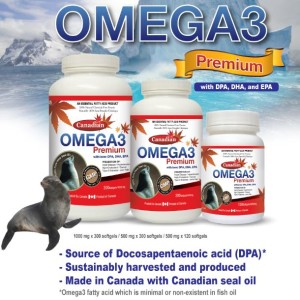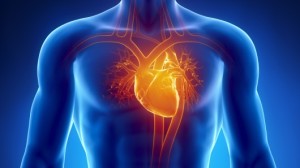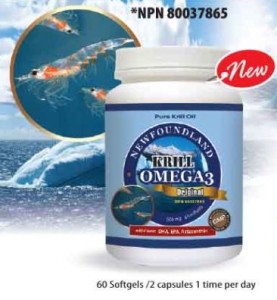Certain superiority of Omega 3
The 18 carbon Alpha-linolenic acid has not been shown to have the same cardiovascular benefits as DHA or EPA (in Omega 3). Currently there are many products on the market which claim to contain health promoting ‘omega 3’, but contain only Alpha-linolenic acid (ALA), not EPA or DHA. These products contain mainly plant oils and must be converted by the body to create DHA and are therefore considered less efficient. DHA and EPA are made by microalgae that live in seawater. These are then consumed by fish and accumulate to high levels in their internal organs. DHA also can be produced directly from microalgae to provide a vegetarian source.
People with certain circulatory problems, such as varicose veins, may benefit from such supplements containing EPA and DHA which stimulate blood circulation, increase the breakdown of fibrin, a compound involved in clot and scar formation, and additionally have been shown to reduce blood pressure. There is scientific evidence that n-3 fatty acids (Omega 3) reduce blood triglyceride levels and regular intake may reduce the risk of secondary and primary heart attack.
Some potential benefits have been reported in conditions such as rheumatoid arthritis and cardiac arrhythmias.
There is preliminary evidence that n-3 fatty acids supplementation might be helpful in cases of depression and anxiety. Studies report improvement from n-3 fatty acids supplementation alone and in conjunction with medication. The New York Times reports that at least one study, however, has found no connection between depression in heart patients and supplements containing n-3 fatty acids.
Some research suggests that fish oil intake may reduce the risk of ischemic and thrombotic stroke, although large amounts may actually increase the risk of hemorrhagic stroke : lower amounts are not related to this risk, 3 grams of total EPA/DHA daily are generally recognized as safe (GRAS) with no increased risk of bleeding involved and many studies used substantially higher doses without major side effects (for example: 4.4 grams EPA/2.2 grams DHA in 2003 study). A systematic review of recent studies found evidence that alpha-linolenic acid does not confer the health benefits of n-3 fatty acids derived from wild fish sources.
CancerSeveral studies report possible anti-cancer effects of n-3 fatty acids (Omega 3) (particularly breast, colon, and prostate cancer). Omega-3 fatty acids reduced prostate tumor growth, slowed histopathological progression, and increased survival. Among n-3 fatty acids [omega-3], neither long-chain nor short-chain forms were consistently associated with breast cancer risk. High levels of docosahexaenoic acid, however, the most abundant n-3 PUFA in erythrocyte membranes, were associated with a reduced risk of breast cancer. A 2006 report in the Journal of the American Medical Association concluded that their review of literature covering cohorts from many countries with a wide variety of demographic concluded that there was no link between n-3 fatty acids and cancer. This is similar to the findings of a review by the British Medical Journal of studies up to February 2002 that failed to find clear effects of long and shorter chain n-3 fats on total mortality, combined cardiovascular events and cancer.
#omega3 #anticancer #stroke #circulatoryproblems #cardiovascular disease #health #healthy #healthyfood #keepyouhealthy




Leave a Comment
You must be logged in to post a comment.